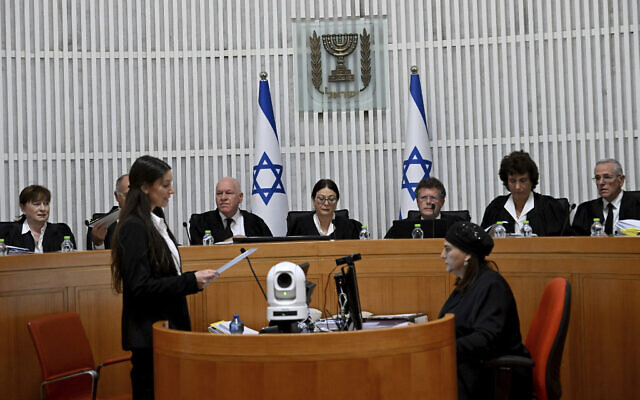The lawyer representing Prime Minister Benjamin Netanyahu’s government sparked an uproar during Tuesday’s high-stakes Tuesday High Court of Justice hearing to adjudicate petitions against the first piece of judicial overhaul legislation when he dismissed Israel’s foundational Declaration of Independence as a “hasty” document endorsed by unelected signatories that cannot be a source of legal authority.
Several justices enumerated the view that the Knesset’s authority to legislate derives from the 1948 Declaration of Independence, which defines Israel as a Jewish and democratic state. Arguing that the Knesset cannot legislate laws — even Basic Laws — that erode Israel’s Jewish or democratic character, the judges indicated that the court thus had the authority to police those guardrails.
But Ilan Bombach, the attorney who is representing the government in the High Court since Attorney General Gali Baharav-Miara has refused to do so, replied that the signatories of the foundational document were unelected and that it was “unthinkable” to say the declaration must “bind all future generations.”
“Because 37 people were authorized to sign the hasty Declaration of Independence, which was still being drafted until the last moment, this should obligate people who came later?” Bombach responded.
The comments at the hearing garnered wide rebuke from the bench and beyond for appearing to downplay the significance of the Declaration of Independence, with the opposition Yesh Atid party seizing on the moment to charge that “there is no clearer proof that there is an anti-Zionist, anti-Israeli, anti-democratic government in Israel that will burn the pages of history and tarnish the founders of the state, all for despicable political considerations.”
While the formulation of the Declaration of Independence indeed only began three weeks before it was read aloud by Israel’s first prime minister David Ben Gurion on May 14, 1948, it went through several drafts and hands before it was signed.

Illustrative: Demonstrators carry a massive Declaration of Independence during a rally in Tel Aviv to protest the Israeli government’s planned overhaul of the judicial system, on February 18, 2023. (Tomer Neuberg/Flash90)
The 37 signatories were members of the Provisional State Council, a body representing the Zionist movement’s various groups.
Later during Tuesday’s hearing, Justice David Mintz, considered among the bench’s most conservative judges, also questioned the idea of the Declaration of Independence as a statutory document.
“By referring to the Declaration of Independence you are creating something out of nothing, there is no implied authority [from the Declaration of Independence],” Mintz told Aner Helman, who was representing the attorney general. Mintz has previously written that the court has no authority to strike down Basic Laws.
Toward the end of the hearing, Bombach assured the court that the government was not about to start working changes into the Declaration of Independence. “But that doesn’t turn it into a legal text. It’s unthinkable to take a document on sovereignty and use it to negate future sovereignty,” he said.

Supreme Court President Esther Hayut and all 14 other judges hear petitions against the ‘reasonableness law’ at the court in Jerusalem on September 12, 2023. (DEBBIE HILL / POOL / AFP)
The lawyer later told the Kan public broadcaster, that the government “wants the Declaration of Independence to continue to serve as the founding document, even though it does not have “constitutional validity.”
An unprecedented panel of all 15 justices presided over the highly charged session in response to petitions against the law, enacted in July, which restricts judicial review of government decisions using the rubric of reasonableness. While no decision is expected for weeks or possibly months, the bench’s reactions and questions, many of which cut to the heart of the state’s foundational tenets, were being closely watched for signs of what direction the court might take and whether a feared constitutional crisis may be in the offing.
Bombach tried several times to switch the discussion to the reasonableness law itself, calling the question of the Knesset’s source of power a “theoretical, academic” discussion, but the justices pressed him on the matter, pointing out that the government’s argument began by stressing the High Court’s lack of authority to intervene in Basic Laws.
Bombach maintained that the reasonableness law does not erode Israel’s democratic character, as the petitioners claim, to which Justice Isaac Amit replied that historically, “democracy dies in a series of small steps,” pointing to the series of other judicial overhaul laws that have been declared or have started their legislative process.



